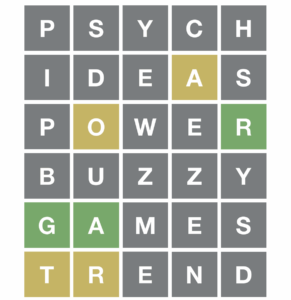 Each morning I ARISE, brush my TEETH, heat some WATER, make some TOAST and THINK about my day.
Each morning I ARISE, brush my TEETH, heat some WATER, make some TOAST and THINK about my day.
But first I open Wordle, the tasty online word game less than a year old and more addictive than potato chips. In an interview with the BBC earlier this year, game inventor Josh Wardle said his aim was to make Wordle something akin to “a delightful snack.” And so I bite. But briefly. Unlike chips or the mindless overindulgence snack food can induce, Wordle rations itself: One word a day, five letters, five chances.
I traffic in language, make my living talking about words, revere Scrabble, parry with friends over vocabulary, thumb through the dictionary for fun. I had a cat named Alphabet. These I offer as my wordplay dorkus maximus bona fides. When Wordle appeared in my social feeds, I was an immediate acolyte. Lots of us were.
According to British psychologist Lee Chambers, Wordle activates the language and logic parts of the brain. My brain—and millions of others—lights up over puzzles because they represent a low-stakes challenge. With Wordle, I get to embark on a challenge wearing my pajamas. However frustrating a game might occasionally be, the dopamine reward for playing the puzzle is a small hit of morning bliss.
Wordle’s start cute origin story sounds as if it were conjured by the Hallmark network. Wardle, a Brooklyn-based software engineer, created the game in October 2021 without an intent for worldwide distribution. He made it as a present for his sweetie, whom he has called a word game fangirl. They played it and shared it with some friends who shared it with some friends. And on it went until it found me.
A month after it was created, about 90 people were playing Wordle. In early January of this year a function was added to the game that allowed an easy sharing of results on social media. Popularity mushroomed. At the start of this year the number of players began at 300,000 and ballooned to over 2 million players a week later. Twitter added to the velocity. When players began tweeting their results, curiosity and interest spiked. Today millions of people play Wordle in 91 languages including Cornish, Kazakh and Klingon.
What began as a gift became a hot commodity. In January the New York Times bought Wordle for its game stable at a price the paper reports was in “the low seven figures.” Time magazine named Wardle one of the 100 most influential people of the year. Wardle tweeted his astonishment at the viral popularity (“I’d be lying if I said this hasn’t been a little overwhelming”) and listed some of the effects of playing the game: “from uniting distant family members, to provoking friendly rivalries to supporting medical recoveries.” Wordle as wellness; that’s some game.
According to a March 2022 article on Medium that calls itself the authoritative list of the highest form of commercial flattery, Wordle spinoffs number around 100 and include Absurdle (a cranky version of Wordle), Dordle (two words), Trordle (three words), Hardle (billed as more difficult than Wordle), Xordle (two Wordles in one), Sedecordle (16 words), Gordle (for hockey fans) and my favorites: Dawdl (make as many guesses as you want to solve the puzzle) and Sweardle (a “sweary word guessing game”). Were I to venture a permutation, my addition to the list would be Girdle, available only to women of a certain age who agree to play the game wearing restrictive undergarments.
My affection for Wordle is not really about the addiction or the dopamine or the bragging rights contained in the green and yellow grids. It is more about the small benevolent universe of my letters, my choices, my satisfactions. I read a piece recently by journalist Lyz Lenz who talks about the salve of starting her day with puzzles. Her words are my thoughts as well. “Some days, I feel as if I am living and working so desperately. The world seems so perilous and fraught, and I’m meat and flesh and nerve endings trying to find a way through it all. And life, if it is worth living, isn’t all tirades and rage against the machine. It’s wine in Rome, it’s roses, it’s puzzles.
“And so, when I wake up, I do my little word puzzles and stare into a world where there is order, and where, just for a moment, I can find the words to make everything right.”
I AGREE.

